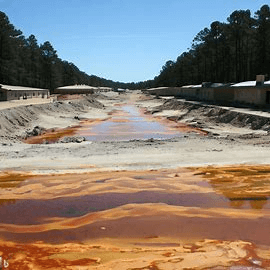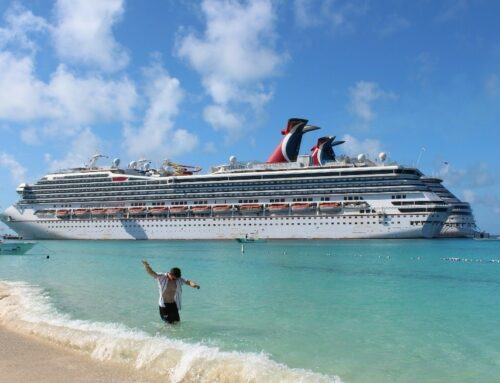The Toxic Legacy of Camp Lejeune
 Imagine drinking, bathing in, and cooking with water that is killing you slowly, even as you fight to serve your Country. Imagine finding out that the government knew and did nothing to stop it!
Imagine drinking, bathing in, and cooking with water that is killing you slowly, even as you fight to serve your Country. Imagine finding out that the government knew and did nothing to stop it!
This is the nightmare that thousands of veterans and their families have lived through at Camp Lejeune, a U.S. Marine Corps Base located in North Carolina. For more than three decades, from 1953 to 1987, the water at Camp Lejeune was contaminated with carcinogens like TCE, PCE, benzene, and vinyl chloride. These chemicals came from leaks, spills, petroleum products, industrial wastewater, and solvents being dumped on and off base, which leached into the groundwater. Up to one million people may have been poisoned.
The consequences have been devastating. Many veterans and their families, as well as civilians who lived or worked at Camp Lejeune during the three-to-four-year contamination period, have developed cancer, neurological disorders, birth defects, and other diseases that can be traced back to the contaminated water. Many died, others have suffered for years without proper diagnosis or treatment. Many of them have struggled to get compensation and justice from the government that betrayed them.
The U.S. Marine Corps discovered the contamination in 1982 and shut down the most polluted wells in 1985. However, the federal government did not inform the public until 1989. In the meantime, they downplayed the scandal, ignoring or manipulating scientific studies linking the contaminated water to the illnesses. The Corps denied or delayed claims from veterans and their families who sought help.
In 2012, Congress passed a law that provided health care benefits to eligible veterans and their family members who were exposed to the contaminated water at Camp Lejeune. The law covered eight conditions that were presumed to be related to the exposure, such as leukemia, bladder cancer, Parkinson’s disease, and multiple myeloma. Children and those exposed utero (before birth) are also covered. The law also required the Department of Veterans Affairs (VA) to establish disability compensation rules for these conditions.
Children and those exposed utero (before birth) are also covered. The law also required the Department of Veterans Affairs (VA) to establish disability compensation rules for these conditions.
In 2017, the VA finalized the rules for disability compensation for Camp Lejeune veterans and their family members. The rules allowed veterans who served at Camp Lejeune or MCAS New River for at least 30 days between August 1, 1953, and December 31, 1987, to file claims for disability benefits on a presumptive basis if they had one of the covered conditions. The rules also allowed family members who lived at Camp Lejeune during the same period to file claims for reimbursement of medical expenses related to the covered conditions.
But these rules were not enough. Many claimants faced obstacles and delays in getting their claims approved by the VA. Some of them were denied benefits based on insufficient evidence or conflicting medical opinions. Others waited for years for their claims to be processed or appealed, only to be disappointed. Many claimants also were frustrated by the lack of transparency and accountability from the VA and the Department of Defense (DoD) regarding the extent and impact of the contamination.
 In 2022, President Joe Biden signed a new law that aimed to remove some of these barriers and improve the process for Camp Lejeune claimants. This law, known as the PACT (Promise to Address Comprehensive Toxics) Act, granted an exception from governmental immunity protections and other laws that had prevented claimants from suing the government for damages related to the contamination. The law also opened a two-year window for claimants to file administrative claims with the U.S. Navy before filing lawsuits in federal court.
In 2022, President Joe Biden signed a new law that aimed to remove some of these barriers and improve the process for Camp Lejeune claimants. This law, known as the PACT (Promise to Address Comprehensive Toxics) Act, granted an exception from governmental immunity protections and other laws that had prevented claimants from suing the government for damages related to the contamination. The law also opened a two-year window for claimants to file administrative claims with the U.S. Navy before filing lawsuits in federal court.
The Camp Lejeune Justice Act (CLJA) of 2022 is a provision of the PACT Act of 2022 that specifically addresses those who were exposed to the contaminated water. The CLJA is unique in that it is the first such law that specifically provides compensation to civilian family members of veterans stationed at the base, as well as civilians who came onto the base for work. Any service member or family exposed for at least 30 days between the dates of August 1, 1953, and December 31, 1987, who has suffered illness or injury as a result is encouraged to file a claim.
Both the PACT Act and the CLJA have been breakthroughs for justice and accountability. According to Reuters, about 5,000 claims have been filed with the Navy in the first month since the law was enacted. Attorneys representing claimants estimate that up to 500,000 claims could be eventually filed. The Navy has said that it will review each claim individually and respond within six months. If a claim is denied or not resolved within six months, the claimant can file a lawsuit in federal court.
The Camp Lejeune water contamination scandal is one of the worst environmental disasters in U.S. military history. This incident has affected thousands of veterans, civilians and their families, who suffer and die due to serious health problems resulting from their exposure to toxic chemicals. It has also exposed the failures and cover-ups of the government agencies that were supposed to protect the men and women who sacrifice so much for us. The PACT Act and the CLJA are steps toward justice and accountability for these victimized veterans, but it remains to be seen how effective it will be in delivering fair compensation and closure.
However, at the Herd Law Firm, PLLC, we support every man, woman, and child exposed to contaminants at Camp Lejeune, and believe you deserve quality, attentive legal representation. We are proud to be able to aid our veterans and their families in seeking restitution for their injuries. I, Charles Herd, am the proud son of a World War II veteran, and Brandon has bravely fought for our country as well!







